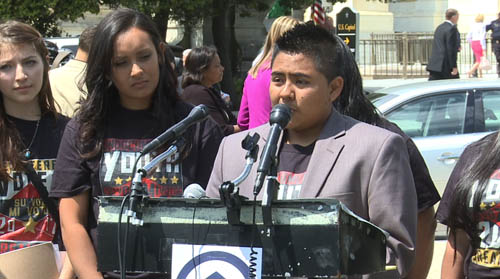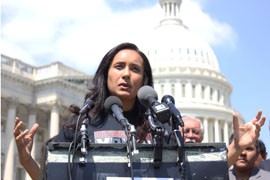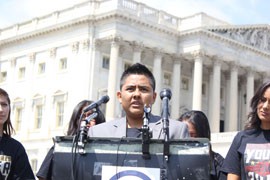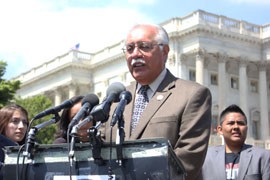Cronkite News has moved to a new home at cronkitenews.azpbs.org. Use this site to search archives from 2011 to May 2015. You can search the new site for current stories.
Campaign urges Latino voters to cast ballots in support of those who can’t
WASHINGTON – As an undocumented immigrant, Queen Creek resident Erick Garcia can’t vote. But that doesn’t mean he can’t have a voice.
Garcia joined other undocumented immigrants and lawmakers Thursday in front of the Capitol to kick off “Su Voz, Mi Voto” – Spanish for “Your Voice, My Vote” – a program aimed to get out the Latino vote and get registered voters to speak for those like Garcia, who can’t vote themselves.
“I am only one of hundreds, perhaps thousands, in Arizona who our friends will be listening to,” said Garcia, 25. “We don’t have a vote, but we have a voice.”
The program is part of a larger effort to win support for the DREAM Act – the Development, Relief and Education for Alien Minors Act – which would create a path to citizenship for certain undocumented students.
Mesa resident Erika Andiola, the program’s lead coordinator, said it is time to “motivate our communities.”
“We have to motivate voters to go out there and show that they do support the DREAM Act, that they do support undocumented youth,” said Andiola, 24, an undocumented immigrant originally from Mexico.
Andiola, who was among those who successfully worked last year to recall Arizona Senate President Russell Pearce, said that with this campaign, undocumented students will make sure their opinions matter.
“DREAM-ers will be out there making sure people know … who is with us and who is against us,” she said.
She and Garcia were joined Thursday by students from Florida, Maryland and New York as well as members of the Congressional Hispanic Caucus. They included Rep. Luis Gutierrez, D-Ill., who said “the road to the White House goes through Latino neighborhoods.”
Rep. Raul Grijalva, D-Tucson, said programs like Su Voz, Mi Voto will ensure that the Latino vote will not be overlooked.
“The movement to empower our community that they will undertake during this electoral season is going to be important,” Grijalva said at the event. “Don’t underestimate the intelligence, the dedication of the Latino community. To underestimate that is to assure – assure – the defeat.”
Rep. Ed Pastor, D-Phoenix, said the Su Voz, Mi Voto campaigners in Arizona have experience, successfully getting Hispanic firefighter Daniel Valenzuela elected to the Phoenix City Council last year through a similar campaign.
“They’re very bright, educated young people,” Pastor said. “They know that elections have consequences, and in order to ensure that their dream will be fulfilled they have to make sure that this cycle … we elect a president, a U.S. Senate and U.S. Congress that will restore their dream.”
But DREAM Act opponents said Thursday they were not concerned by Su Voz, Mi Voto. The campaign is nothing new and “doesn’t really contribute anything new to the discourse on immigration reform,” said Kristen Williamson, spokeswoman for the Federation for American Immigration Reform.
She said FAIR and most Americans do not support the DREAM Act or other legislation that offers amnesty to undocumented immigrants.
“There may be a small fraction of American voters who speak loudly about the DREAM Act and comprehensive amnesty, but most Americans have shown that they do not support the DREAM Act or any legislation that rewards illegal aliens because it is fundamentally unfair,” she said.
The Arizona Republican Party also said immigration is not the most important issue to Latino voters.
“The Latino community is just very, very focused on jobs and the economy, and that’s what we’re running on,” said Shane Wikfors, spokesman for the Arizona Republican Party. “They’re a very intricate part of our political objectives and vision for the state of Arizona.”
“The issues that are most important to Hispanics in Arizona are the same as those that are most important to everyone else in the state,” he said.
But the DREAM Act is important to Garcia, a 2011 Arizona State University graduate who could benefit from the act.
“I would just like to work and support (my parents),” said Garcia, who studied to be a computer science engineer.












